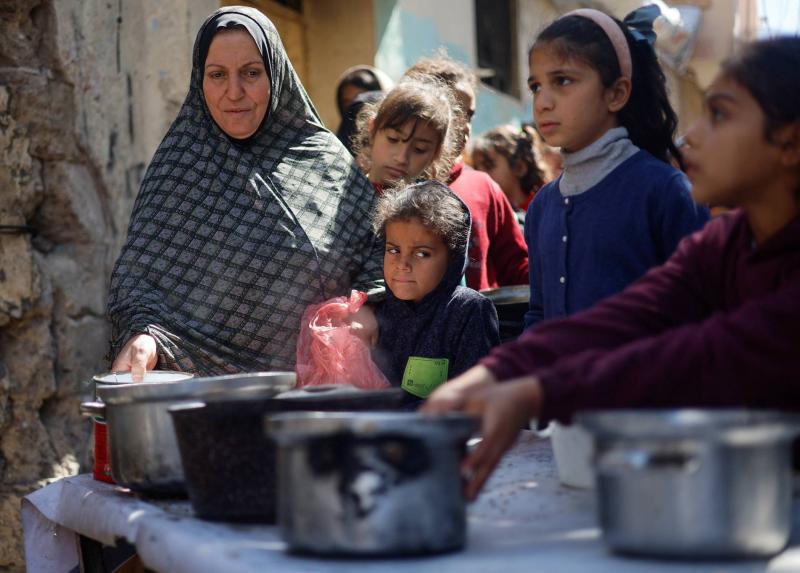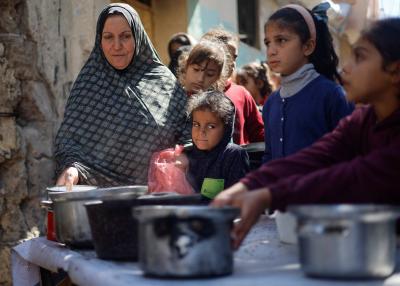The delivery of aid to Gaza has become increasingly urgent after five months since the beginning of the Israeli assault, which led to the displacement of most of the 2.3 million residents of the Palestinian territory and caused severe shortages of food, water, and medicine, along with the collapse of the social system. Here are some key facts about the situation in the Gaza Strip:
*Displacement*
The United Nations Relief and Works Agency for Palestine Refugees in the Near East (UNRWA) estimates that around 1.7 million people, or over 75 percent of the population, have been displaced within Gaza, with many forced to move multiple times. Last month, Israel intensified its bombing of the city of Rafah in southern Gaza, which is home to about 1.5 million people, most of whom have fled from their homes in the northern territory to escape the Israeli military campaign that began following the attack launched by militants from Hamas on southern Israel on October 7.
*Aid and Hunger*
On March 4, the Director-General of the World Health Organization, Tedros Adhanom Ghebreyesus, reported from a team that visited hospitals in Gaza that children are dying of hunger in northern Gaza. Jens Laerke, spokesperson for the United Nations Office for the Coordination of Humanitarian Affairs, stated, "When children start dying of hunger, it should be an unparalleled warning." He added, "If not now, then when is the right time to do everything possible, declare a state of emergency, and flood Gaza with the assistance it needs?" Israel halted all imports of food, drugs, energy, and fuel to Gaza at the start of the war. It later allowed some aid shipments through Egypt and the Kerem Shalom Crossing, but relief organizations say that security inspections and difficulties navigating a war zone severely hinder their operations. United Nations agencies report that malnutrition rates among children in northern Gaza are "extremely high," about three times higher than in the southern part where aid is more available. Israel has faced pressure to take greater steps to address the humanitarian crisis after Palestinians were killed while waiting for aid in Gaza last month. Health authorities in Gaza reported that 118 people were killed by Israeli fire in what they described as a massacre. Israel claims many of these people were trampled and has pledged to investigate.
*Health and Hospitals*
The World Health Organization states that most of the 36 hospitals in the sector have ceased operations. Only 12 hospitals are partially functioning, with six in the northern sector and six in the south, while Al-Amal Hospital in Khan Younis operates at minimal capacity. Richard Peeperkorn, WHO representative in Gaza and the West Bank, stated on March 5 that more than 8,000 individuals need to be evacuated from Gaza for treatment. A WHO team and partners visited Kamal Adwan and Al-Awda hospitals in northern Gaza to deliver supplies for the first time since the fighting began. Ahmed Daher, WHO’s sub-office director in Gaza, remarked, "The two hospitals we visited reflect the health system in Gaza as a whole, struggling to continue operating on very limited supplies, hardly able to serve those in need."
*Egypt, Hamas, and Security Forces*
Egypt is transferring international aid through its borders with Gaza but has consistently criticized Israel for obstructing aid deliveries, which Israel denies. Egypt is keen to send aid to Gaza due to fears of mass displacement of Palestinians to the Sinai Peninsula. Israel claims Hamas diverts aid for its own benefit, a claim Hamas denies, stating that it has no role in the distribution of goods managed by the United Nations and the Red Crescent. Hamas's Ministry of Interior has largely ceased operations due to heavy bombardments affecting its forces, offices, and vehicles, resulting in the deaths of many prominent leaders, including police officers tasked with protecting aid trucks passing through Rafah, as well as the head of Gaza's crossings and borders authority. A grassroots group formed by armed factions in Gaza has begun attempts to maintain order.
*Airdrops*
The Coordinator of Government Activities in the Territories, the Israeli military agency responsible for aid transfer operations, states that it coordinates aid convoys, facilitates tactical corridors, and deploys officers with field units to ensure passage. At the end of February, Israel also began working with private contractors to deliver aid to refugee locations in northern Gaza. However, the unit's spokesperson, Shimon Friedman, noted that distribution and security are ultimately the responsibility of relief agencies and the United Nations. Countries including the United States have started conducting airdrops of aid, which Friedman indicated Israel supports. The U.S. military executed its first airdrop of food aid for Gaza residents on March 2. However, aid agencies claim that airdrops deliver fewer supplies than trucks can transport and may not reach the most affected individuals.
*Israeli Hostage Situation*
It is believed that at least 134 hostages remain held among the 253 captives taken by Palestinian militants to Gaza during the October 7 attack, which also resulted in the deaths of around 1,200 people, according to Israeli statistics. Israeli authorities state that the hostages are kept isolated from the outside world and that the Red Cross cannot access them. Amit Sosana, who was held captive for 55 days, described being moved from place to place under the constant guard of armed Hamas members, receiving very little food, and being monitored even during her most private moments, experiencing physical and psychological violence. One of the places where she was held was a dark, damp tunnel 40 meters underground, making it difficult to breathe. She stated that being there felt like being buried alive. The armed wing of Hamas, Izz ad-Din al-Qassam Brigades, on March 1 declared that the Israeli assault resulted in the deaths of over 70 hostages. Israeli officials generally declined to comment on Hamas’s statements regarding the hostages, dismissing them as psychological warfare. It remains uncertain how many of the hostages are still alive.




